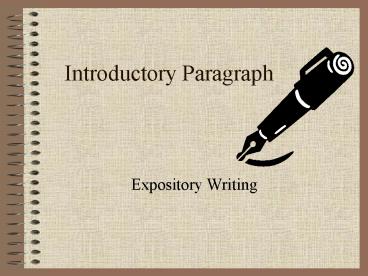Introductory Paragraph - PowerPoint PPT Presentation
1 / 15
Title:
Introductory Paragraph
Description:
Introductory Paragraph Expository Writing Purpose of the Introductory Paragraph Captures the reader s interest Introduces the topic Presents the focus /thesis ... – PowerPoint PPT presentation
Number of Views:492
Avg rating:3.0/5.0
Title: Introductory Paragraph
1
Introductory Paragraph
- Expository Writing
2
Purpose of the Introductory Paragraph
- Captures the readers interest
- Introduces the topic
- Presents the focus/thesis statement
3
Ways to develop an Introductory Paragraph
- Share interesting or surprising details about the
subject or use a great quote! - State the focus /thesis statement
- Give interesting background information
4
What are the required three elements needed for
an Introductory Paragraph?
- 1. A Lead a good topic sentence
- 2. Thesis - focus statement
- 3. Interesting facts or details
5
Leads in Expository Writing
- What's the most boring way you could begin a
research report about the human brain? A
rattlesnake? The United States Constitution? We
all know.. . . In the report I will tell you
about. . . "Now that we know that, let's
experiment with difference places to start.
6
A Good Lead / Topic Sentence
A good topic sentence
Snapshot Observation Question Connection Favorite
fact
the topic
People often think all planets are alike, but
there are actually three types of planets in our
solar system
three different types
planets in our solar system
7
1. Start with a Snapshot.
- When you paint a picture, you draw the reader in
. Notice the difference between these two leads
to a report about ice-skating. - BoringIce-skating is my favorite sport.
- BetterIt's ten degrees below zero and the river
is frozen a foot thick. It makes snapping sounds
like the limbs of trees cracking. A long figure
glides along the black ice, moving toward the
city. The only sound is the scraping of each
blade as it bites into the river. That's me doing
my favorite sport, ice-skating.
8
2. Start with an important observation.
- Don't start in the general. Put your most
surprising or important observation into you
opening. - GeneralThe human brain is a complex and amazing
organ. - BetterSeeing stars, it dreams of eternity.
Hearing birds, it makes music. Smelling flowers,
it is enraptured. Touching tools, it transforms
the earth, but deprived of these sensory
experiences, the human brain withers and dies.
(Inside the Brain --- Ronald Kotulak)
9
3. Start with a strongly stated question your
readers might have.
- In some ways all writing is about trying to
answer our best questions. A strong question is
one we all want to know the answer to. - Weakly-statedIn this paper I will attempt to
answer the question why history is important. - BetterWhat's the point of studying history? Who
cares what happened long ago? After all, aren't
the people in history books dead?
10
4. Put your connection with the subject in the
lead.
- Why are you attracted to the subject? Do you have
a personal reason for writing about this subject?
What specific memories of the subject come to
mind? - GeneralThe problem of longitude was one of the
greatest scientific challenges of its day. - BetterOnce on a Wednesday excursion when I was a
little girl, my father bought me a beaded wire
ball that I loved. At a touch, I could collapse
the toy into a flat coil between my palms, or pop
it open to make a hollow sphere. Rounded out it
resembled a tiny Earth, because its hinged wires
traced the same pattern intersecting circles that
I had seen on the globe in my school room -- the
thin black lines of latitude and longitude.
(Longitude --- Dava Sobel)
11
5. Flaunt your favorite bit of research in the
lead.
- Start with the facts that made you smile, laugh,
go "ahaaa" or just plain grossed you out. - GeneralDid you ever wonder why God created
flies? - BetterThough we've been killing them for years
now, I have never tested the folklore that with a
little cream and sugar, flies taste very much
like blackraspberries.
12
Writing Your Thesis Statement
13
What is a Thesis Statement
- A thesis statement
- tells the reader how you will interpret the
significance of the subject matter under
discussion. - is a road map for the paper in other words, it
tells the reader what to expect from the rest of
the paper. - directly answers the question asked of you. A
thesis is an interpretation of a question or
subject, not the subject itself. The subject, or
topic, of an essay might be World War II or Moby
Dick a thesis must then offer a way to
understand the war or the novel. - makes a claim that others might dispute.
- is usually a single sentence somewhere in your
first paragraph that presents your argument to
the reader. The rest of the paper, the body of
the essay, gathers and organizes evidence that
will persuade the reader of the logic of your
interpretation.
14
Sample Thesis Statements
The 100- year-old Yerkes Observatory in Williams
Bay Wisconsin, (an interesting subject) has the
largest refracting telescope in the world. (the
fact to emphasize)
The International Space Station (an interesting
subject) is the combined project of 16 different
countries (the fact to emphasize)
15
Review Three elements of a well developed
introductory paragraph
A lead a good topic sentence
Interesting facts or details
Thesis focus statement































